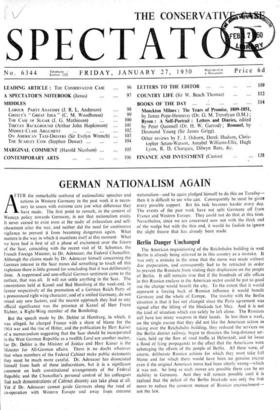GERMAN NATIONALISM AGAIN
AFTER the remarkable outburst of nationalistic speeches and actions in Western Germany in the past week it is neces- sary to assess with extreme care just what difference they have made. The first point to remark, in the context of Weste(n policy towards Germany, is not that nationalism exists.
It never ceased to exist even at the nadir of exhaustion and self- abasement after the war, and neither did the need for continuous vigilance to prevent it from becoming dangerous again. What matters is the way in which it manifests itself at this moment. What we have had is first of all a phase of excitement over the future of the Saar, coinciding with the recent visit of M. Schuman, the French Foreign Minister, to Dr. Adenauer, the Federal Chancellor. Although the claims made by Dr. Adenauer himself concerning the German interest in the Saar mines did something to touch off this explosion there is little ground for concluding that it was deliberately done. A suppressed and non-official German sentiment came to the surface, that was all. It will not settle anything in the Saar. The conventions held at Kassel and Bad Homburg at the week-end, in favour respectively of the promotion of a German Reich Party of a pronounced right wing character, and of a unified Germany, do not reveal any new factors, and the nearest approach they had to any official significance was the presence at Kassel of Herr Franz Richter, a Right-Wing member of the Bundestag.
But the speech made by Dr. Dehler at Hamburg, in which, it was alleged, he charged France with a share of blame for the 1914 war and the rise of Hitler, and the publication by Herr Kaiser of a memorandum suggesting that the Saar should be incorporated in the West German Republic as a twelfth Land are another matter, for Dr. Dehler is the Minister of Justice and Herr Kaiser is the Minister for All-German affairs. There is no doubt whatever that when members of the Federal Cabinet make public statements they must be much more careful. Dr. Adenauer has dissociated himself from both of these indiscretions, but it is a significant comment on both constitutional arrangements of the Federal Republic and the Chancellor's personal control of his colleagues that such demonstrations of Cabinet disunity can take place at all. Yet if Dr. Adenauer cannot guide Germans along the road of co-operation with Western Europe and away from extreme•
nationalism—and he again pledged himself to do this on Tuesday— then it is difficult to see who can. Consequently he must be given every possible support. But his task becomes harder every day. The events of the past week have not split Germany off from France and Western Europe. They could not do that at this time. Nevertheless, since we are concerned now not with the thick end
• of the wedge but with the thin end, it would be foolish to ignore the slight fissure that has already been made.










































